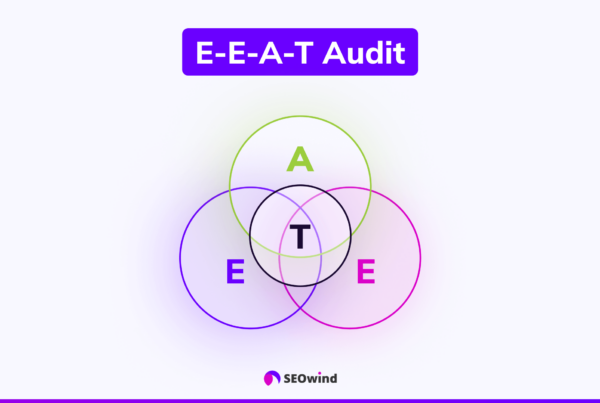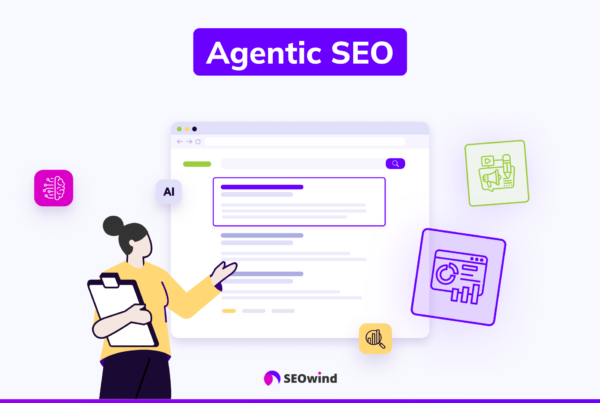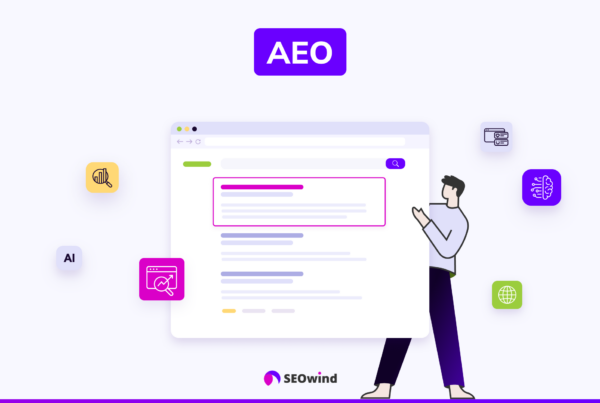Search engine optimization (SEO) has become a vital marketing tool for businesses to drive organic traffic and improve online visibility. As digital competition intensifies, it’s more important than ever to stay ahead of the curve by optimizing your SEO strategy. Leverage AI content for SEO – an innovative approach that uses the power of artificial intelligence (AI) to take your SEO game to unprecedented heights. But what exactly is AI content for SEO? How can you utilize it to maximize results? This comprehensive guide will answer those questions and much more. Let me demonstrate how AI can be your secret weapon for transforming your website’s performance, boosting user engagement, and leading you to top search engine result pages.
What is AI Content for SEO?
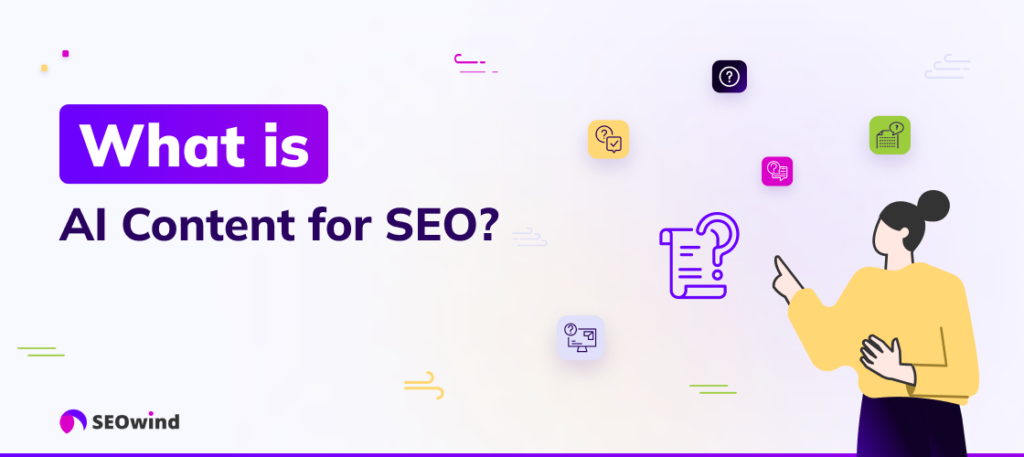
At its core, AI content for SEO refers to any text or multimedia produced with the help of artificial intelligence algorithms specifically designed to optimize a site’s performance on search engines like Google. This groundbreaking technology goes beyond merely generating buzzwords. Instead, it employs cutting-edge techniques such as natural language processing (NLP), machine learning (ML), and data analysis to craft impactful content that appeals to search engines and human users.
There are several ways in which AI can be utilized for SEO:
- Keyword research: The advanced AI-powered tools enable more accurate keyword choices and deeper insights into user intent.
- Content generation: Leveraging NLP capabilities helps craft engaging, personalized content that satisfies user queries and search engine guidelines.
- Title tags & meta descriptions: Generating optimized titles and meta descriptions automatically ensures they comply with character limits while focusing on high-converting keywords.
- Analysis & optimization: Machine learning algorithms analyze multiple factors influencing SERP rankings and provide targeted suggestions for improvement.
By blending creativity with technical know-how, AI content empowers you with an enormous strategic advantage in today’s fast-paced, digitally-driven market. In the following sections, we will delve deeper into the benefits of AI content for SEO and explore various tools and best practices to help you succeed in your digital marketing endeavors.
Benefits of AI Content for SEO
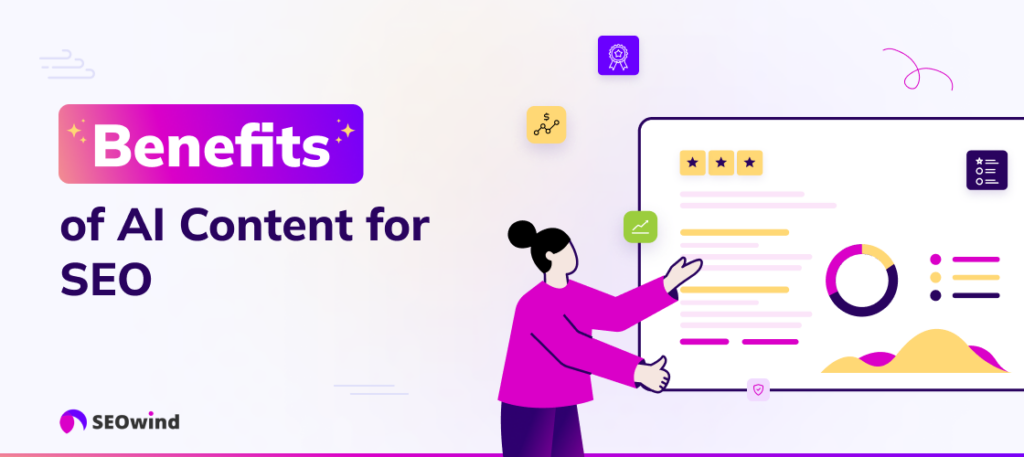
Embracing AI SEO content can significantly benefit businesses and digital marketers. By harnessing artificial intelligence, organizations can stay ahead of the competition by improving their web presence and ensuring top-notch user experience. Here are some key advantages of leveraging AI content for your SEO strategy:
Optimized Content Generation
One of the main strengths of using AI for SEO is its ability to create optimized content designed specifically for search engine success. With advances in natural language processing and generation, AI technology can quickly produce well-structured articles that adhere to the best practices in online writing, like proper keyword usage and easy readability. Moreover, several AI-powered platforms offer creative suggestions based on relevant topics while keeping up with current trends.
Time and cost efficiency
Mark Twain once said, “The secret of getting ahead is getting started.” But in our context, I’d argue the secret is also doing things efficiently and effectively.
- Time-Saving: With AI tools capable of drafting quality content within moments, you can say goodbye to writer’s block and slow turnaround times. These tools have been trained using massive datasets, including high-ranking SEO content.
- Cost Reduction: Hiring specialized writers or investing countless hours into research can carve a deep hole in your budget or time resources. AI makes high-quality content production faster and more accessible without draining your coffers.
Enhanced User Experience
Creating a high-quality user experience is essential for website owners and search engines like Google. As a result, many algorithms prioritize pages that are informative, accessible, and visually appealing. Integrating AI-driven tools into your marketing strategies allows you to anticipate user preferences more accurately and provide personalized recommendations accordingly. Consequently, this leads to increased engagement rates and improved organic traffic.
More Accurate Keyword Research
Efficient keyword research holds immense importance in attracting organic traffic to any website. Now, with sophisticated machine learning systems designed specifically for SEO purposes, businesses can perform more precise keyword analysis processes than ever before.
These intelligent platforms analyze competitors’ keywords alongside internet users’ real-world interests to generate comprehensive research data sets, including valuable long-tail phrases which are indispensable yet often neglected during manual keyword analysis procedures.
Improved SERP Rankings
Adopting cutting-edge technologies such as artificial intelligence and machine learning significantly enhances your site’s visibility within modern search engines like Google. Often called SEO ai or ai-generated content, these tools leverage advanced analytics from previous consumer searches to identify optimal text structures compatible with higher SERP rankings — it focuses on Google’s highly valued E-A-T (Expertise, Authoritativeness, Trustworthiness) principles. This refined understanding helps you optimize your content for topics that matter most to internet users and thus increase its rankings sustainably within search engine result pages.
Scale Content Production
The most striking capability of AI writing technology is its potential to produce content at a scale that would be challenging, if not impossible, for humans alone. By employing AI platforms for SEO purposes, businesses can quickly create high-quality posts or articles explicitly tailored to targeted markets faster than with manual efforts alone.
Enabling batch content generation with consistent quality results also saves considerable time and resources in the long run while propelling marketing strategies toward achieving maximum impact.
How to Use AI Content for SEO
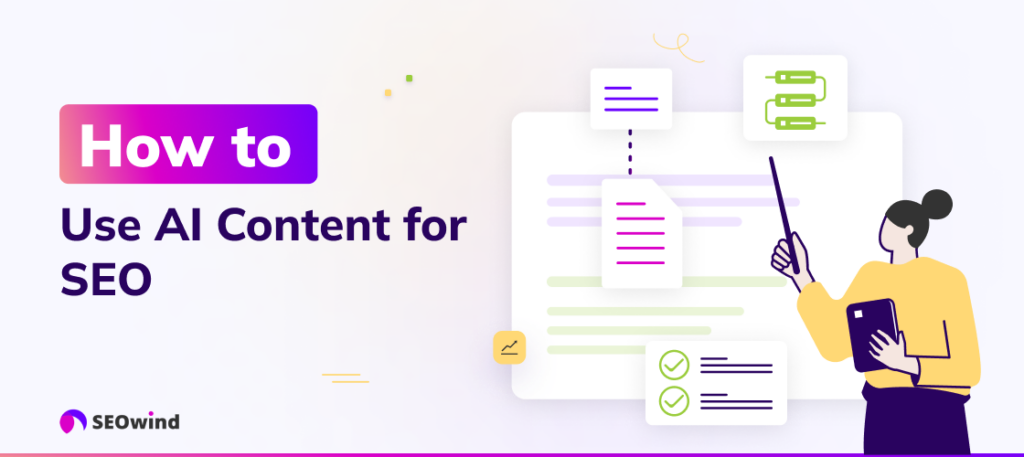
Incorporating artificial intelligence (AI) into your content strategy can be a game-changer, allowing you to optimize your content and boost your search engine rankings. The following steps outline how you can effectively use AI content for SEO purposes across all stages of the content creation process.
Brainstorm Ideas with AI SEO
AI-powered tools can help you target high-performing topics within your niche when developing content ideas. These tools analyze existing data and trends to suggest fresh topic ideas while keeping user intent in mind. To brainstorm efficiently:
- Utilize AI-driven analytics platforms that provide insights on trending topics.
- Analyze top-ranking competitors’ content using an AI-assisted tool.
- Test potential blog post titles with an AI-based headline analyzer.
Keyword Research with AI SEO
SEO focuses heavily on keywords, which guide search engines toward relevant content for users. Efficiently conducting keyword research is essential. Using AI-enhanced keyword research tools allows you to make informed choices when selecting target keywords throughout the following process:
- Choose the main keywords based on relevance, search volume, and competition level.
- Use an AI-informed tool to discover secondary or long-tail keywords related to your primary focus.
- Use AI-generated content sprinkling LSI (Latent Semantic Indexing) keywords naturally in the document – this helps search engines understand context without relying solely on primary keywords.
Outline with AI SEO
Start by creating a comprehensive outline that structures your thoughts and ensures proper coverage of all critical points on the given topic using AI SEO content management systems such as SEOwind, Frase, or MarketMuse:
- Define subsections within your main theme that discuss various aspects of the subject matter.
- Create subheadings highlighting critical areas worth exploring under each section.
- Annotate these subheadings accordingly, outlining vital information to include within their respective regions.
Generate Title Tags & Meta Descriptions
AI-driven content management systems can help generate effective and engaging title tags and meta descriptions for your articles. These elements are crucial when it comes to search engine results pages (SERP) rankings as they directly affect click-through rates:
- Use AI tools to recommend suitable title tags enriched with targeted keywords.
- Make sure the AI-generated titles are accurately reflective of your article content.
- Utilize AI solutions in crafting enticing meta descriptions while maintaining keyword inclusion and adhering to character limits.
Content Creation with AI Writing Tools for SEO
Creating engaging and relevant content is crucial for optimizing your website’s SEO performance. Following these steps will ensure the smooth creation of valuable automatically generated content:
- Start with thorough research of top-performing content, their keywords, meta tags, outline, topics,
- Enter outlines into an AI-powered content generator, such as SEOWind, and allow them to assist with creating initial drafts.
- Enhance coherency within generated drafts by filling in gaps and ensuring a seamless flow of ideas.
- Ensure that primary and secondary keywords are strategically incorporated throughout the blog post.
Still, choose the AI content tools carefully. Make sure that they are designed to produce long-form content for SEO purposes. If not, they might create spammy and poor-quality content that will provide poor results.
Proofread & Optimize Content
No content is complete without thorough proofreading for grammar and style errors and optimization checks for improved readability. Leverage AI-based editing platforms, like Grammarly or Hemingway Editor, which excel at identifying common mistakes and recommending improvements:
- Assess the readability score provided by these platforms to make sure proper accessibility is maintained.
- Aim for an optimal readability grade level below nine – ensuring most readers can comprehend your work.
How SEOwind Generate AI Content for SEO?
SEOwind is a leading platform that harnesses the power of artificial intelligence to create innovative, highly optimized SEO content. Let’s look into detail how SEOwind generates AI content for SEO.
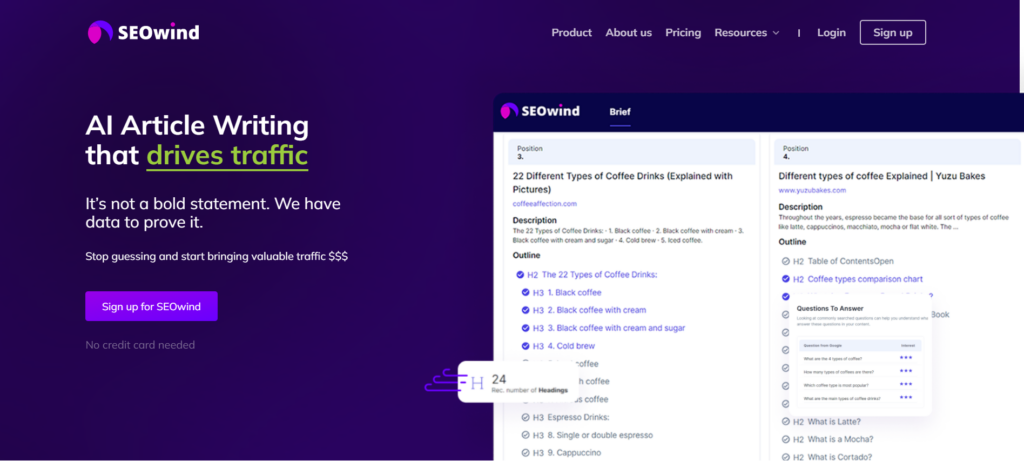
AI Writing Based on Research
One of the core principles of quality digital marketing and search engine optimization is providing value through well-resourced and thoroughly researched content. SEOwind utilizes advanced AI algorithms to analyze top-performing content and gather accurate data from reliable sources across the internet. This enables the platform’s content creation system to produce articles that are:
- Relevant to your chosen topic
- Comprehensive and covering topic in-depth
- SEO optimized with relevant keywords
By grounding its AI writing process in robust research, SEOwind ensures that users receive dependable, valuable content – the cornerstone of effective search engine optimization.
AI Content for SEO That Drives Organic Traffic
To maximize organic reach and bring more visitors to your website, it’s paramount that you consistently deliver authentic and informative content richly infused with relevant keywords. SEOwind can automatically generate articles woven with pertinent keywords while maintaining a natural flow.
Additionally,
- The platform analyzes user intent behind keyword searches
- It crafts engaging headlines that entice readers
- And keeps viewers on your site longer by offering helpful content.
These factors contribute to more clicks, shares, and inbound links – all working synergistically to boost your online visibility.
AI Writing Challenge Results – Case Study
As SEOwind, we know that our AI articles drive traffic.
We conducted a case study that we named #100Posts30DaysChallenge – an intense 30-day journey to demonstrate the power of our SEOwind tool in driving organic traffic through AI-generated content. The challenge was to publish 100 AI-generated articles on our SEOwind website within 30 days.
The data that emerged from this experiment were impressive. Comparing the 30-day challenge period to the previous 30 days, the Google Search Console (GSC) data showed remarkable growth:
- Clicks increased by 77.69%, surging from 1349 to 2397.
- Total impressions more than doubled, experiencing a staggering 124.77% increase (jumping from 428k to 962k).
These astounding figures highlight AI-generated content’s immense potential and effectiveness in driving organic traffic. Especially when it is powered by Cyborg Method.
Google’s E-A-T Guidelines & AI Content


As the world of Search Engine Optimization (SEO) continues to evolve, so do the guidelines and standards set by search engines like Google. Expertise, Authority, and Trustworthiness are crucial factors significantly influencing website rankings – commonly known as E-A-T guidelines. Let’s see how artificial intelligence can help content creators adhere to these guidelines more effectively.
Understanding E-A-T Guidelines
Before diving into the benefits of using AI for SEO to E-A-T guidelines, it’s essential to understand what they entail.
- Expertise refers to the expertise demonstrated by the content creator or author. Google values high-quality content written by knowledgeable individuals who possess relevant experience and qualifications in their field.
- Authority: The authority of a website or its authors represents how well-respected they are within their industry or niche. A higher authority often translates into better credibility and trust from users and search engines.
- Trustworthiness: Last but not least, trustworthiness encompasses factors such as site security, transparency, customer reviews, and accurate information provided consistently.
Abiding by these guidelines is fundamental for success in SEO. Nonetheless, many businesses struggle with optimizing their content accordingly. This is where AI can step in to enhance your efforts.
Can AI be aligned with E-A-T Guidelines?
Utilizing AI-driven tools and platforms can substantially improve adherence to E-A-T guidelines in several ways:
- Research Accuracy: Many AI systems excel at conducting research in various niches efficiently while maintaining topical relevance – this aids content creators in providing expert knowledge that aligns with current trends.
- Credibility Assessment: Some advanced AI-driven tools assess an author’s online presence to establish whether they possess adequate credentials related to their domain expertise – a boon for businesses seeking authoritative content.
- Content Quality Enhancement: AI applications can optimize readability, grammar, and overall structure to ensure the content aligns with trustworthiness standards.
Moreover, using AI for SEO has become compatible with E-A-T guidelines since search engines emphasize a user-focused approach.
Key Takeaways
Incorporating AI into your SEO strategy can assist you in meeting Google’s E-A-T guidelines. By providing accurate, authoritative, and trustworthy information through an intelligent system capable of optimizing content quality, you stand a better chance of increasing visibility online, driving more organic traffic to your site, and ensuring lasting success in the competitive digital market space.
AI Content Generators & Tools
With the rapid advancements in artificial intelligence, various AI content generators and tools have emerged to help marketers optimize their SEO efforts. These innovative technologies harness machine learning algorithms to process vast data and create high-quality content that caters to user intent. This section explores some popular AI-driven content creation solutions and how they can streamline your SEO strategy.
GPT by OpenAI
Lauded as one of the most advanced language models, Generalized Pre-trained Transformer 4 (GPT-4) is an excellent tool for generating human-like text based on contextual understanding. With impressive natural language processing capabilities, GPT can breathe life into your content creatively and accurately.
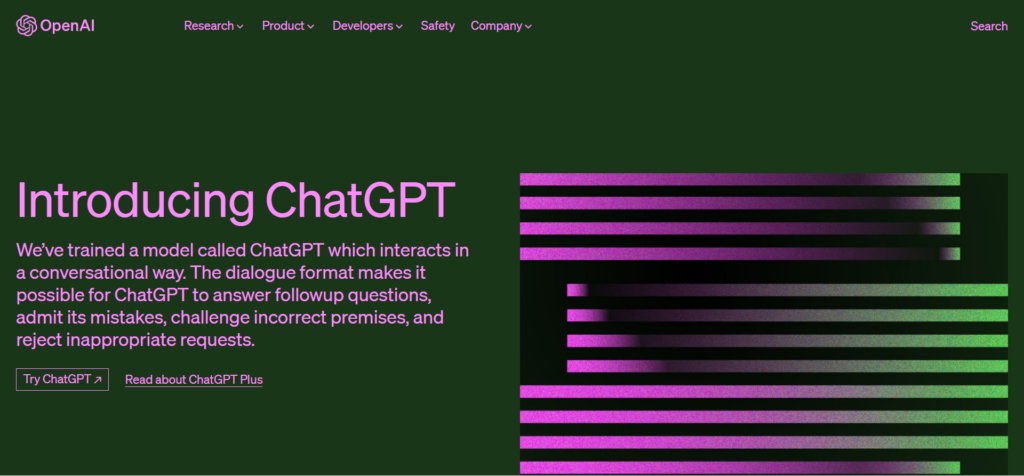

SEOwind.io
SEOWind is a powerful AI-driven platform dedicated to producing AI content for SEO that drives organic traffic. By intelligently analyzing target keywords, this tool creates engaging articles tailored for higher search engine rankings while maintaining E-A-T guidelines.



Frase.io
This versatile tool uses artificial intelligence for SEO by providing valuable insights into user intent and competitor analysis. Frase.io generates topic ideas, conducts extensive keyword research, and helps you develop optimized content outlines to keep you ahead in the SERPs.
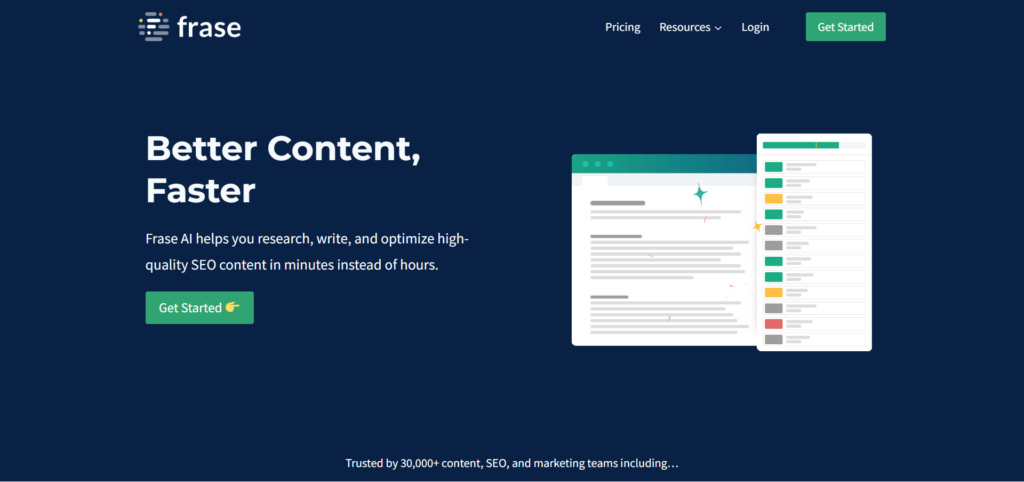

Jasper
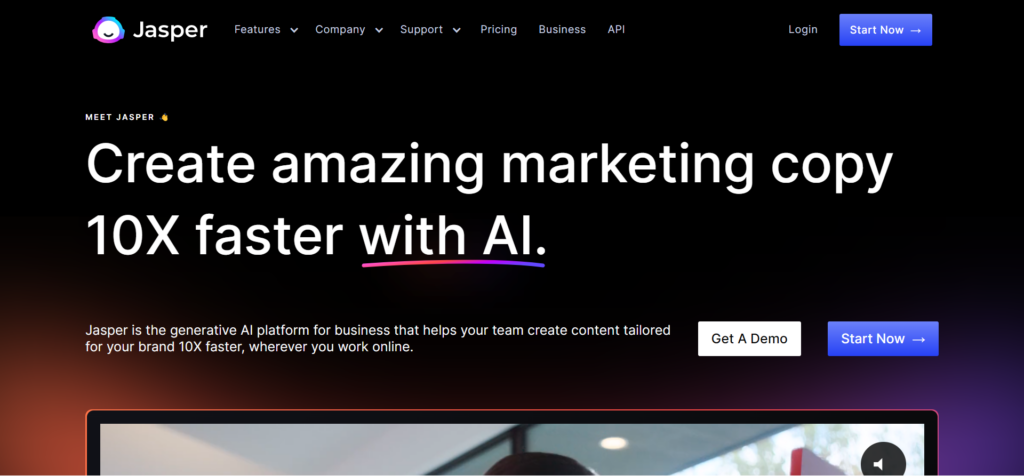

Jasper is an intuitive writing assistant that efficiently produces quality content tailored for online success using AI-generated keywords and tactics specific to SEO needs. Its versatile features include drafting blog posts, website copy, ad copies, and social media updates – all aimed at improving user experience and driving organic traffic.
Clearscope
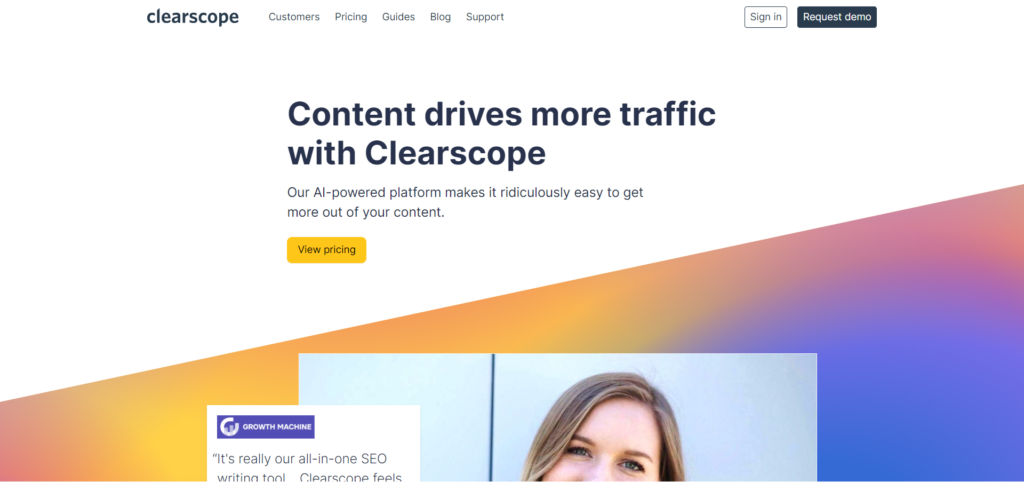

Clearscope leverages AI for SEO by consolidating data from relevant sources such as Google Search Console and Google Analytics to offer real-time suggestions on optimizing content for desired keywords. It also provides actionable recommendations on readability improvements, so it appeals to both users and search engine crawlers.
AI content generators and tools can significantly elevate your SEO game. Not only do these solutions simplify the process of crafting compelling online content, but they also optimize it according to industry best practices. Integrating these technologies into your digital marketing strategy allows you to stay ahead of competitors while catering to growing audience expectations for rich and engaging web experiences.
Guidelines for Implementing AI-Generated Content Strategies
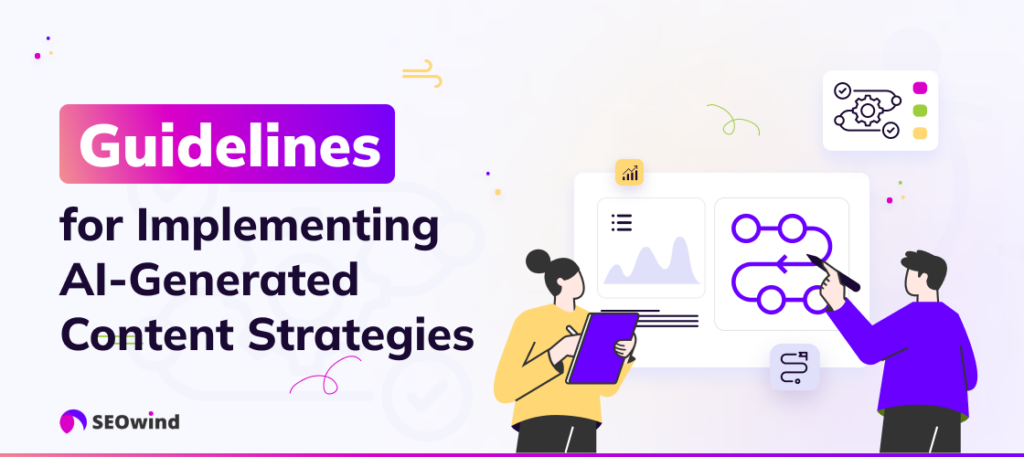

Embarking on a digital journey with AI content creation requires thoughtful planning and strategic implementation. Once you’ve chosen to enhance your SEO strategies with AI-powered tools like SEOwind, you’ll find a new horizon of potential unfolds – but this integration must be approached with precision.
Evaluating the suitability of AI-generated content for your business
Discuss whether implementing AI in your content strategy aligns with your company’s objectives. Consider these elements:
- Content Volume Requirements: Does your brand require large volumes of content regularly? If so, AI can significantly amplify productivity.
- Resource Allocation: Evaluate if investing in AI will enable more efficient use of human labor by freeing time from repetitive tasks.
- Content Complexity: For highly technical or niche topics, determine if AI can match the depth of knowledge required or if human expertise is indispensable.
In understanding its utility, reflect on how products like SEOwind are crafted to aid businesses. Its ability to understand tone, audience nuances, and specialized terminologies could make it as an invaluable addition to your toolkit.
Establishing a workflow for integrating AI into your content strategy
The magic happens when humans and technology collaborate effectively. This is where the CyborgMethod™ comes into play. I’ll guide you through conceptualizing a workflow that utilizes both human insight and machine efficiency:
- Define Objectives: Be clear about what you want the AI-generated content to achieve – more traffic, higher engagement, better conversions.
- Research Configuration: Input comprehensive research parameters within SEOwind to align with those objectives.
- Human-AI Symbiosis: Determine which stages of creation – from ideation to publishing – will be led by humans and where AI will take charge.
- Quality Assurance Process: Plan for robust editing and review procedures post-AI generation to ensure voice congruency and data accuracy.
Measuring success and optimizing AI-generated content
Quantifying the impact of any strategic move is essential; Hence, measuring the performance of your AI-created materials reveals insights that steer future decisions:
- Monitor key performance indicators (KPIs) such as organic traffic growth, improvement of keyword rankings, and engagement metrics changes compared to pre-and post-AI integration.
- Utilize feedback loops from analytics platforms alongside human assessments; Update the system for enhanced outcomes iteratively.
Best Practices for Using AI Content for SEO
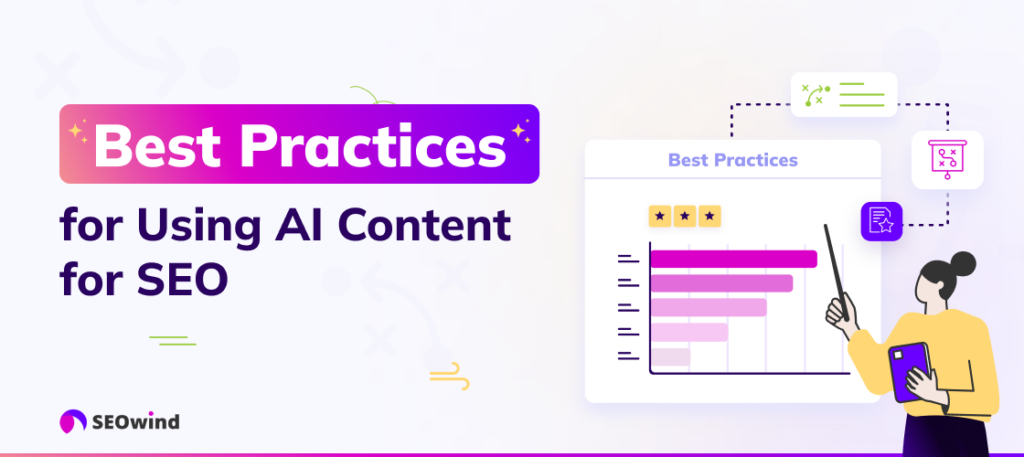

When integrating artificial intelligence into your search engine optimization strategy, adhering to specific best practices is crucial. These guidelines will help ensure that the AI content for SEO you generate is more effective in driving organic traffic and improving your SERP rankings.
1. Following Google’s Guidelines for AI-Generated Content
Navigating the intricate web of SEO requires adherence to the rules set by the predominant gatekeeper – Google. Google’s content guidelines serve as a North Star for digital marketers and content creators who wish their work to stand out in search engine results pages (SERPs).
When using AI to generate your content, ensure that:
- The content adds value: Your material must provide helpful information beyond what is readily available on other sites.
- Stick to quality over quantity: Avoid producing large volumes of shallow-content pages that do not help users but are merely intended to rank well in search engines.
- Maintain originality: The text should offer unique perspectives or insights rather than simply paraphrasing existing sources.
Remember, even though it is generated by an AI tool, you’re responsible for ensuring that every piece published under your brand’s name meets these standards. Integrate keywords without forcing them unnaturally into context. Let them flow with the natural rhythm of your prose.
Moreover, keeping the end-user in mind is essential: good SEO isn’t just about appeasing algorithms. It’s about sharing knowledge and connecting with readers through engaging stories.
2. Maintain a Human Touch in Your Content
While artificial intelligence has made tremendous strides in generating well-researched content, maintaining a human touch is still vital. To achieve this balance:
- Leverage AI tools to draft essential elements like headlines, subheaders, meta descriptions, etc.
- Engage your audience by adding anecdotes or experiences when appropriate
- Emphasize important points using conversational language rather than overly technical jargon
Remember that users connect with true stories. Aim for a harmonious blend of computer-generated ideas and relatable human experiences.
3. Creating Transparent and Trustworthy Content
Trust plays a pivotal role in how users interact with online content. To build trust through your AI-generated pieces, consider these points:
- Be upfront about using AI assistance: Do not mislead readers into thinking all your content is written manually if it isn’t – transparency fosters trust.
- Human oversight is vital: Always review and edit AI-produced drafts to ensure they align with your brand voice and adhere to ethical writing principles.
- Reference credible sources: Link back to authoritative research or studies to enhance credibility for statistics or data presented in your content.
By following these steps diligently, you will create high-quality, trusted content that resonates with audiences while satisfying search engines’ demand for authenticity and authority.
4. Target Relevant Keywords
As you use AI for SEO, remember that selecting relevant keywords remains an essential part of the process. Utilize AI tools to conduct comprehensive keyword research and identify highly valuable search terms related to your industry or niche. Make sure you prioritize the following aspects:
- Search volume
- Keyword difficulty
- Relevance to user intent
5. Prioritize Readability & Formatting
Using AI for SEO should never sacrifice readability and formatting quality. Focus on structuring your content effectively by adhering to these tips:
- Use headings and subheadings strategically: Organize ideas coherently by breaking up content into smaller sections.
- Use bullet-point lists: Simplify complex concepts or statistics through brief explanations.
- Ensure proper paragraph spacing: Making information more digestible through white space management will enhance the reader experience significantly.
Remember that skim-readers are common. Make it easy to access key insights by separating them visually from the rest of the content.
6. Optimize without Overstuffing Keywords
When incorporating AI keywords into your content, be cautious not to engage in keyword stuffing. Google’s algorithms have become increasingly sophisticated, and relying on this outdated tactic may result in penalties rather than rewards. Instead, aim to:
- Disperse high-priority keywords organically throughout the article
- Utilize LSI (Latent Semantic Indexing) techniques for natural language support
- Always prioritize user intent over search engine requirements
You should always create content keeping the end-user in mind. Strike a balance between SEO optimization and valuable information delivery for optimal results.
7. Continuous Monitoring & Improvement
Lastly, leveraging AI-generated content requires an ongoing commitment to monitoring performance and making necessary adjustments. Review key metrics like organic traffic, SERP rankings, and bounce rates to determine if your strategy yields positive outcomes. Use data insights to inform potential improvements and align your approach with trends or algorithm updates within the SEO landscape.
By implementing these best practices when using AI content for SEO, businesses can maximize their chances of ranking higher on search engine result pages and driving more organic traffic for greater success online.
How to make AI content SEO-friendly
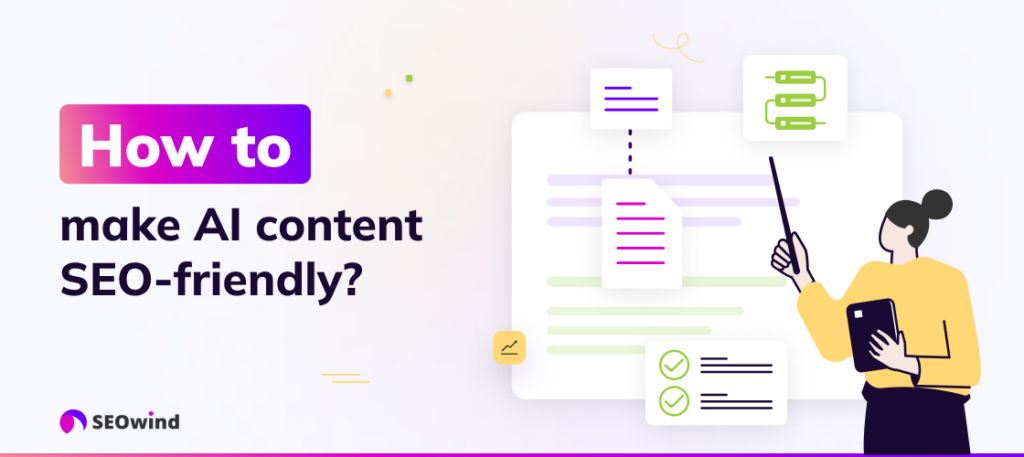

Entering SEO field can feel like navigating a labyrinth filled with ever-shifting algorithms and esoteric rules. However, the integration of artificial intelligence (AI) into this world offers an intriguing path forward. You might be pondering, “Does AI content rank in Google?” or perhaps you’re curious about how optimization AI tools can enhance your website’s visibility. Let’s demystify these concerns together.
Optimizing AI-Content for Search Engines
Before getting started, let’s set the stage: yes, AI-generated content can indeed rank in Google, provided it is optimized correctly and offers real value to readers. If done without adherence to certain principles, it might wane in performance compared with carefully curated human-written articles.
To harness the full potential of your AI-generated material for top-notch SEO rankings while cultivating trust with your audience, consider employing these strategies:
- Emphasize Quality and Relevance: Aim for substantial quality just as much as any traditional content creation process would demand. Relevancy should be your North Star. Optimization goes beyond keyword stuffing. Focus on delivering meaningful answers to user queries.
- Finetune with SEO Content Optimization Tools: Leverage powerful SEO content optimization tools. These platforms help refine keywords, suggest topic relevance, readability improvements, and provide other critical insights — all invaluable in sculpting your content to meet users’ needs and search engine requirements.
- Focus on Natural Language Use: Strive for naturalness in language flow that mimics human writing styles. After all, Google’s algorithms prioritize user experience above everything else. Ensure that sentences are varied in length and structure to keep the rhythm engaging.
Adhering to Webmaster Guidelines
Above all else, transparency reigns supreme when using AI-created content for SEO purposes:
- Label Your Content Accurately: While incredible strides have been made in making machine-generated text sound human-like, honesty remains paramount. Clearly identify which parts of your content are AI-generated.
- Don’t Ignore Human Touch: Combine AI efficiency with human insight whenever possible—use this dynamic duo to finetune messages, ensuring that warmth and personal engagement aren’t lost amidst bytes of data processing.
Creative Usage of Content
Lastly, Incorporate Engaging Multimedia Elements: Videos, infographics, and images complement textual information, providing a robust user experience — another checkmark ticked for SEO favorability!
Common Mistakes to Avoid When Using AI Content for SEO
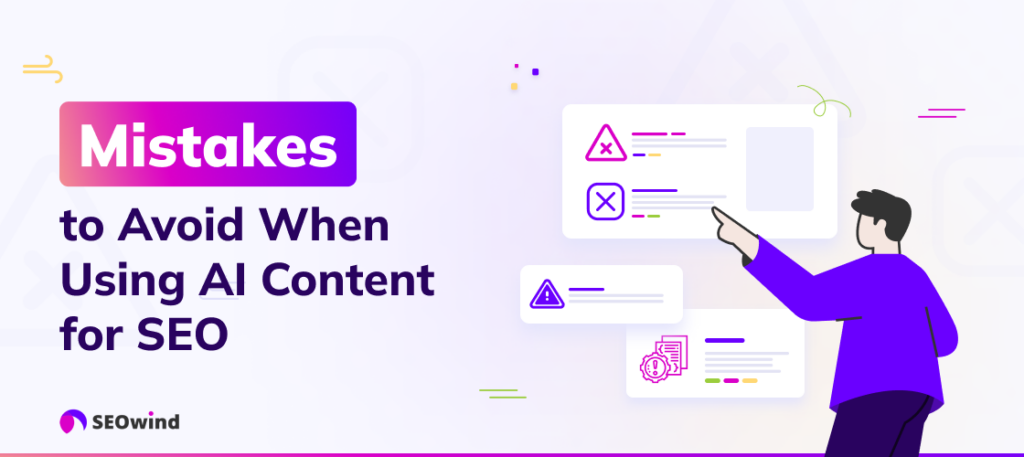

When incorporating artificial intelligence into your search engine optimization strategies, it’s essential to consider the potential pitfalls and challenges. Here are some common mistakes to avoid when using AI content for SEO.
Over-Optimizing Your Content
AI-generated content can excel at optimizing text for specific keywords. However, overdoing this optimization may lead to keyword stuffing, negatively impacting the user experience and search rankings.
To avoid this mistake:
- Focus on creating high-quality content that adds value for users.
- Ensure your text is natural by sprinkling relevant keywords throughout the piece instead of overcrowding them in one section.
Relying Solely on AI-Generated Text
While AI-generated content can save time and effort in content production, relying solely on it might hinder the quality of your output. Effective SEO requires a human touch and judgment as well.
To optimize your usage of AI tools:
- Combine AI-generated work with manual editing.
- Aim to customize output before publishing.
- Tailor the language based on your target audience’s preferences and expectations.
- Add your experience on top.
Ignoring Google’s E-A-T Guidelines
Google’s Expertise, Authoritativeness, and Trustworthiness (E-A-T) guidelines emphasize providing accurate information backed by reliable sources while showcasing expertise within a given field.
Therefore, consider these steps:
- Ensure that your AI-written pieces follow EAT principles.
- Regularly update content with pertinent references to maintain credibility.
- Prevent content from being generated based on false or misleading premises.
Neglecting User Intent
Understanding user intent should be a primary consideration when using AI for SEO. Keywords alone won’t suffice. You must incorporate engaging elements, such as solid headlines and compelling visuals that resonate with readers.
Here’s how you can align content with user needs:
- Base topics around users’ questions or needs, aiming to provide helpful solutions.
- Utilize AI-generated pieces as supplementary content rather than the focal point.
- Craft high-quality content that prioritizes readers’ interests.
Adopting AI Content Without Adapting Your SEO Strategy
Integrating AI into your existing strategies necessitates a flexible approach to blend machine-driven and human-generated content seamlessly. Adopting AI tools without adjusting your overall process can lead to inefficiencies and wasted resources.
To successfully embrace AI in your SEO strategy:
- Seek ways to incorporate both human and artificial intelligence in creating unique, relevant content.
- Determine how AI-generated elements contribute positively to user experience without sacrificing key aspects such as E-A-T guidelines and proper keyword usage.
- Consider expanding your team’s skillset to accommodate new technologies efficiently.
By addressing these common mistakes, you will be better equipped to use AI content effectively for SEO, deriving maximum advantage while minimizing potential negative consequences.
Common Questions on AI Content for SEO
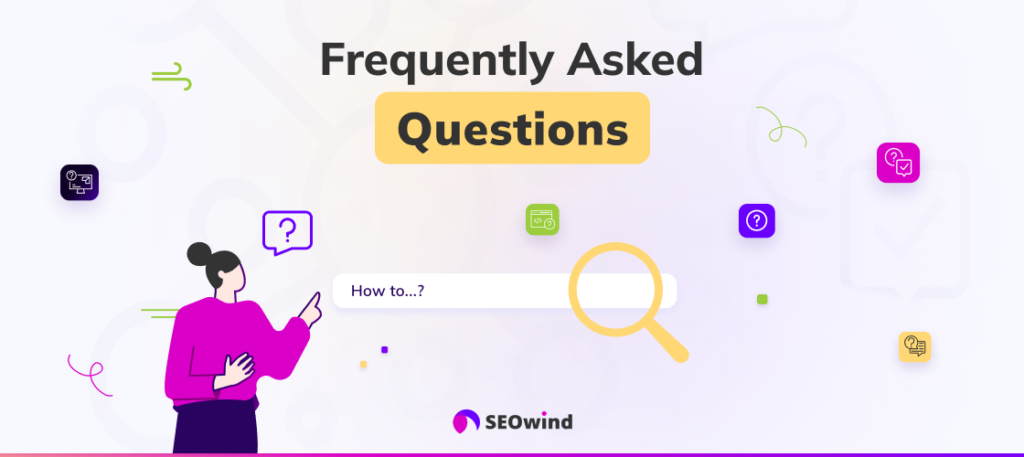

1. Is AI content good for SEO?
Artificial intelligence has transformed the digital marketing landscape, with AI-generated content starting to play a significant role in search engine optimization (SEO) strategies. When crafted effectively and tailored to the target audience’s interests and needs, such content can benefit SEO. Drawing from vast data sources, AI-powered tools can generate informative and engaging articles, ensuring readability and keyword relevance.
However, it is essential to supplement AI-generated content with human inputs to preserve the originality and creativity that resonates with readers. By striking a balance between leveraging AI capabilities and maintaining high-quality writing standards, one can use AI content advantageously for SEO purposes.
2. What is AI-optimized content for SEO?
AI-optimized content refers to articles or blog posts that have been enhanced using artificial intelligence tools to improve their performance in terms of search engine ranking. This process usually involves researching relevant keywords, analyzing competitor websites for gaps, fine-tuning on-page elements such as headers and meta descriptions, optimizing link profiles, and assessing other factors affecting organic visibility. In addition to traditional keyword research approaches like Google Keyword Planner or Moz Pro Rank Tracker Tool, more businesses are now investing in advanced algorithms capable of optimizing online text at scale. It applies to both new posts through real-time insights while composting, existing published/web ones via semantic analysis measured against machine-learning models built around user intent/context uniqueness.
3. Can AI-generated content affect SEO?
AI-generated content can certainly impact a website’s SEO performance, both positively and negatively. On the one hand, it assists businesses in generating keyword-focused content that addresses internet users’ queries, thereby improving their chances of higher search engine rankings. Moreover, AI tools reduce the time and effort required to research appropriate keywords and create captivating titles, allowing marketing teams to focus on other crucial aspects of their strategy.
However, there is also a potential downside. If the generated content falls short in quality or relevance or leans too heavily upon rephrasing existing information found publicly, it could lead to penalties from search engines. As a result, the AI content can underperform or get deindexed. Additionally, AI-generated content may lack the nuances and creativity human writers can provide, potentially leading to a less engaging user experience.
While AI-generated content has advantages and can enhance a website’s SEO when utilized correctly, it is crucial to balance AI-generated content and unique, high-quality, human-generated content to ensure optimal search engine performance and user satisfaction. We advise using Cyborg Method to leverage AI potential and build on human experience and expertise. This brings the best results.
